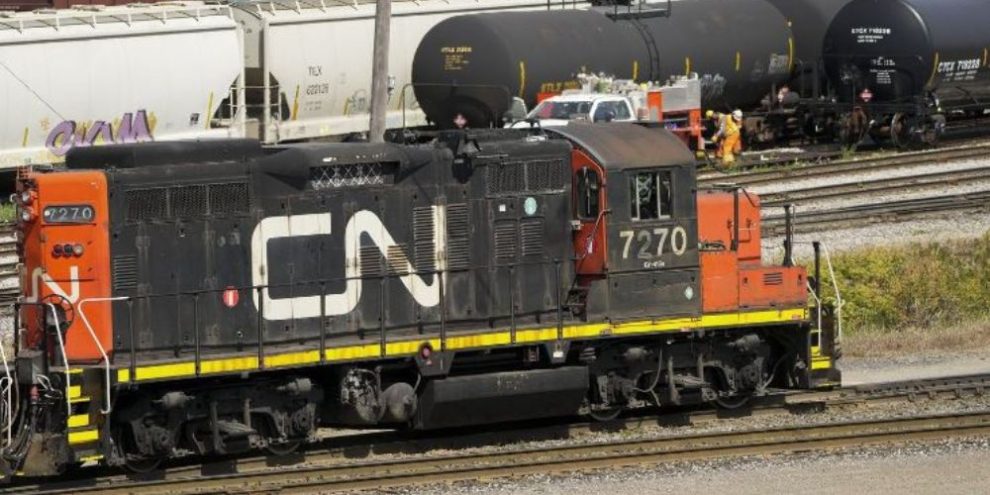
Updated August 13, 2024 @ 3:17pm
The country's two main railways have started to halt shipments ahead of a potential strike or lockout next week, the first step toward a possible shutdown as the bargaining deadline approaches.
Canadian National Railway Co. said in an internal memo obtained by The Canadian Press that the company began to embargo hazardous goods from the U.S. on Monday in anticipation of a work stoppage.
The category includes chlorine to disinfect drinking water and ammonia for fertilizer, as well as other toxic or poisonous substances and explosive materials.
"In the absence of reaching a timely tentative agreement or referring all outstanding matters to binding arbitration before the threat of a labour disruption, additional commodities will be subject to embargo," stated the companywide message from CN's bargaining team, sent on Tuesday.
On Friday, Canadian Pacific Kansas City Ltd. said it would temporarily ban traffic of dangerous materials to ensure none wind up stranded on the tracks in the event of job action.
Effective Monday, the company had embargoed all freight classified as toxic or poisonous "inhalation hazards" on its North America-wide network according to a customer advisory.
"CPKC’s operational focus is on ensuring a safe, structured shutdown of all of our Canadian train operations," the update said, adding that executives "remain available" to bargain.
The two railways warned last week they will lock out 9,300 engineers, conductors and yard workers on Aug. 22 unless they find common ground on new contracts after negotiations stalled over scheduling and wages.
Shippers say a work stoppage would snarl the country's supply chain, halting freight traffic and disrupting industries.
Goods critical for public health as well as agriculture, mining and forestry are typically among those subject to initial embargoes, said Bob Masterson, CEO of the Chemistry Industry Association of Canada.
"When you talk about public safety, those are the volumes that are going to disappear first," he said, highlighting chlorine for municipal drinking water.
"Usually they'd have a week's worth of supply and it's being refreshed on an ongoing basis. If we don't get there for a week and then there's the work stoppage ... you're going start to feel some pains."
Barrie's News Delivered To Your Inbox
By submitting this form, you are consenting to receive marketing emails from: Central Ontario Broadcasting, 431 Huronia Rd, Barrie, Ontario, CA, https://www.cobroadcasting.com. You can revoke your consent to receive emails at any time by using the SafeUnsubscribe® link, found at the bottom of every email. Emails are serviced by Constant Contact
Members of the industry group, composed of producers of plastics and chemicals, rely on rail transport for 80 per cent of the sector's $100 billion in annual shipments, he said.
With most Canadian-made fertilizer moved by rail as well, Fertilizer Canada says perceptions of the country's trade reliability hang in limbo.
"Canada's reputation has been damaged by the numerous supply chain disruptions in recent history," said association president Karen Proud in a release. "This uncertainty gives our international competitors, like Russia and China, an advantage."
Railways begin slowing down service ahead of a work stoppage, including issuing embargoes that halt the movement of certain products. Embargoes issued today impact essential ammonia fertilizer products. Service for all products will also begin to slow three to five days ahead of a work stoppage and take three to five days to reach regular service once it ends.
The railways' lockout warnings to the Teamsters Canada Rail Conference last Friday came hours after the national labour board ruled that a work stoppage would pose no "serious danger" to public health or safety, opening the gate to a full-fledged strike or lockout. If either occurs, employees at CN or CPKC would not be compelled to continue hauling goods.
The labour tribunal ordered a 13-day cooling-off period as part of the dual decisions Friday morning, leaving Aug. 22 as the earliest possible date for a strike or lockout.
The Business Council of Alberta on Tuesday demanded federal intervention, echoing a call from more than 70 industry groups and 40 local chambers of commerce last week.
"Should a prolonged work stoppage occur, the adverse impact for all Canadians will be deep and long-lasting, with many of the most significant impacts felt by Western Canadian farmers," wrote Adam Legge, president of the Alberta business council.
"We urge the government to immediately take all actions necessary to achieve a speedy resolution."
Labour Minister Steven MacKinnon, who sat down with railway and union representatives last week, has urged the two sides to hash out a deal at the bargaining table.
This report by The Canadian Press was first published Aug. 13, 2024.





